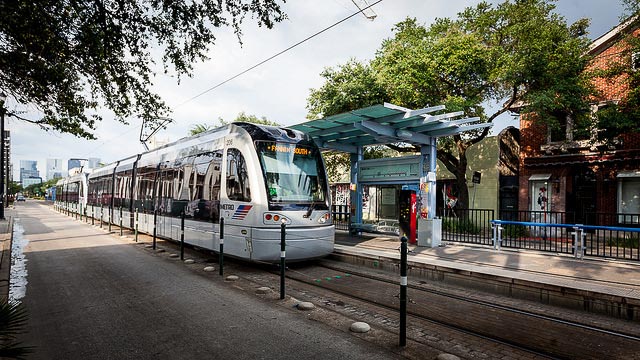On Tuesday Priya Zachariah, regional and long-term planning manager for the Metropolitan Transit Authority of Harris County, and other Metro officials presented the draft proposal for MetroNEXT to citizens, seeking feedback on rider priorities in a series of public meetings.
"Our primary goals are to improve mobility by moving more people, enhance connectivity to connect more people, support vibrant communities through being a good neighbor and ensure a return on investment by getting the most bang for the buck," Zachariah said during her presentation. "In reality, we ask what can we really do and what can we really afford? What is that first step that you can take to achieve this vision?"
The latest vision, which extends to 2040, includes 20 miles of light rail extensions, including to Hobby Airport, 75 miles of new bus rapid transit along five lines, an expanded regional express network, targeted service enhancements and system-wide improvements.
Zachariah said equity, accessibility, safety and stewardship are the core tenets of the plan saying in part, "These tenets aren't pick-and-choose, but instead they are woven through and through each and every aspect of the plan. Investments are multi-layered and range from sidewalks to light rail extensions."
A small group of about 15 joined the discussion and their concerns ranged from equity in the plans to rail investment strategies to how specific transit characteristics work. Below are a few of the questions that arose.
Q: How much was equity in income taken into account for these plans?
Very much so, though there are some shortfalls.
Following the announcement of Mayor Sylvester Turner's Complete Communities initiative, Metro looked at its proposed plans for MetroNext to ensure that the five pilot communities are served. Each of the five communities, Acres Home, Gulfton, Near Northside, Second and Third Wards, have proposed improvements. Acres Home likely will be the most impacted with a significantly expanded North Shepherd Transit Center.

Photo credit: Metro
"We approached the plan thinking, how can we tie into these lower-income communities?" Zachariah said. "We partnered with LINK Houston and their recent study on transit equity in Houston and we found that MetroNEXT's plans are well aligned, but sometimes we do fall short, like 24-hour service. That, logistically, is just too big of an ask."
Q: How much are you working with the City to ensure complete streets are designed for all types of commuters, not just riders, but also pedestrians and cyclists?
Ultimately, it's a partnership.
"There's always a planning partnership with the city and our other partners," Zachariah said. "We are already helping the city with their first-and-last mile program and we have a dedicated team to coordinate with all of our partners." Ultimately, Metro relies on several partners to do their jobs in order to be successful. Zachariah pointed to how Metro and riders use the city's infrastructure, including the roads, street and pedestrian lights, freeways and sidewalks, so it takes coordination to ensure that all travelers, from pedestrians to cyclists to people with disabilities, are all acknowledged in the designs.
Q: Why is Hobby getting a rail line, but not Bush Intercontinental?
Ultimately, budgets as well as planning for the future.
During her presentation, Zachariah pointed to the cost-effectiveness of bus rapid transit (BRT), which she highlighted as a similar experience to rail lines, but for a fraction of the cost.
Through the plan, Metro estimates that it will be able to increase its ridership by 103 percent, which translates to 632,000 passenger trips carried by the system every day, and take away 134,000 car trips on Houston's roads each day, which removes about 1 million vehicle miles traveled every day.

